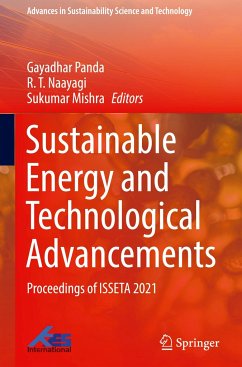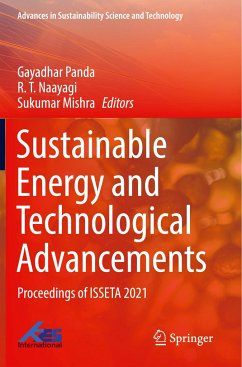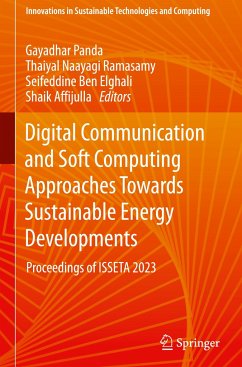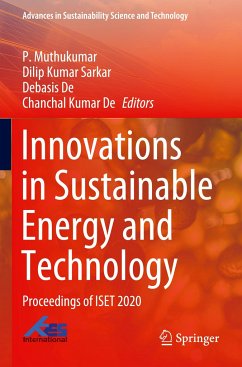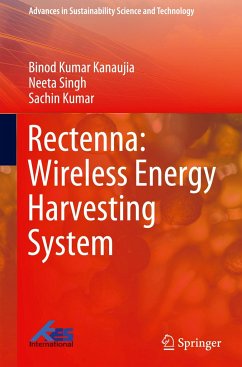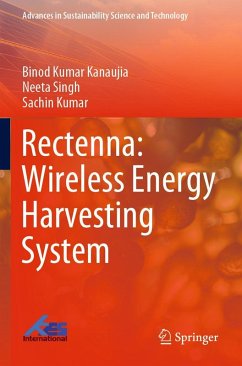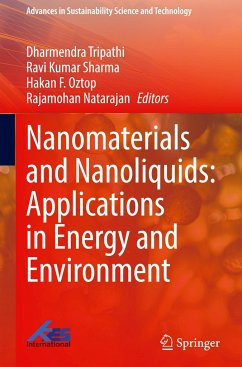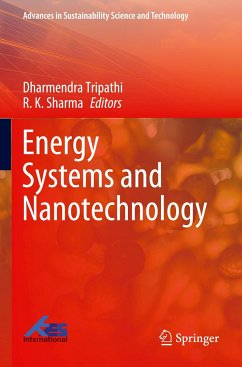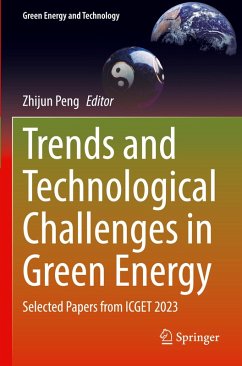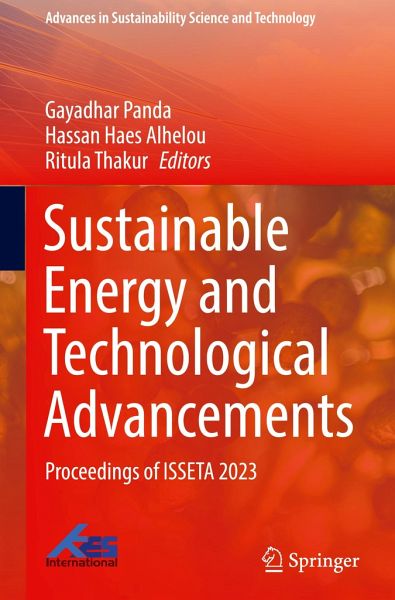
Gebundenes Buch
Sustainable Energy and Technological Advancements
Proceedings of ISSETA 2023
Herausgegeben: Panda, Gayadhar; Alhelou, Hassan Haes; Thakur, Ritula
Versandkostenfrei!
Versandfertig in 6-10 Tagen
Weitere Ausgaben:

PAYBACK Punkte
113 °P sammeln!




This book contains selected papers presented at Second International Symposium on Sustainable Energy and Technological Advancements (ISSETA 2023), organized by the Department of Electrical Engineering, NIT Meghalaya, Shillong, India, during February 24-25, 2023. The topics covered in the book are the cutting-edge research involved in sustainable energy technologies, smart building technology, integration and application of multiple energy sources; advanced power converter topologies and their modulation techniques; and information and communication technologies for smart micro-grids.
Prof. Gayadhar Panda received his Ph.D. degree from the Utkal University in 2007 in electrical engineering. Dr. Panda joined NIT Meghalaya as an Associate Professor in 2013 and subsequently promoted to the Professor in the year 2017 Electrical Engineering Department. Currently, he is administered with temporally position of Director, National Institute of Technology, Meghalaya, India and also associated in various capacities as Dean (Academic Affairs), Dean (Faculty Welfare), HOD, Department of Electrical Engineering, chairperson/member of the national and institutional level committees apart from his academic and research work activities. Dr. Panda has over 24 years of teaching and research experience. To his credit, he has authored more than 130 research papers in various peer reviewed journals and conferences at the national and international level and filed 3 patents. He has also published 1 Book,5 Book Chapters as well as served as one of the Editors of 1st ISSETA publication in Springer Book Series. He was invited to deliver over 33 keynote / invited talks at National/International conferences, Workshops and Training Programs. Dr. Panda serves as TPC Chair or member of various International conferences. Also 08 nos of scholars have been awarded with Ph.D Degrees under his supervision and currently 06 nos of Research's scholars are pursuing their research works under his supervision. Prof Panda was decorated with the prestigious award of the Power Medal, IE(India) for his published research work and World's Top 2 Percent Scientist's Published by Stanford University in the year 2020 and 2022. He has completed a good number of sponsored research projects on the integration of renewable energy generation and power quality improvement. He is a Senior Member of IEEE, Fellow of IE, and Life Member of ISTE. Dr. Panda is Associate Editor for IEEE Access, ITES, Wiley and also serves on the editorial board for the IJEEPS, De Gruyter and the technical/steering committees for several conferences. He has organized several technical events like IEEE Conference, Symposium, National Workshops, etc. He has delivered several invited Talks at various national and international events. His current research interests include automatic generation control, stability improvements using flexible alternating current transmission system devices, power quality, power electronic converters, and distributed power generation. His work involves design, implementation, and operation of AC/DC microgrid with interfacing converters that use digital signal processing, artificial intelligence techniques and other novel control methods. Dr. Ritula Thakur is presently working as an associate professor in the Department of Electrical Engineering, NITTTR, Chandigarh, and has work experience of over 18 years in teaching at postgraduate level. Her work experience comprises imparting training in the latest cutting-edge areas to teachers at engineering colleges, polytechnics, and industry professionals, and teaching M.E. in Electrical Engineering. She has guided around 200 M.E. theses and 3 Ph.D. students. Dr. Thakur has successfully coordinated 3 MOOCS Courses in SWAYAM portal in smart grid, developed curriculum in Electrical Engineering, developed technical instructional material in the form of videos, manuals, published more than 200 research papers in national/international journals and conferences, undertaken consultancy projects related to LED designing for streetlights for Municipal Corporation, Chandigarh, which received National Energy Conservation Award from Bureau of Energy Efficiency. Dr. Ritula is also working at various administrative levels such as a NBA coordinator for department for M.E. program, member of various committees of Institute. She has also delivered expert lectures at various engineering colleges as well as at international level such as MKAI Forum. Herresearch interests include micro-grid and smart grid, real-time modeling and simulation of power systems, embedded systems and micro-controllers, power systems, PLC and SCADA, electrical engineering and information technology in agriculture, IoT and AI in precision agriculture, quality analysis and detection technology in food materials, sensors, and instrumentation. Dr. Thakur has worked as a visiting scholar in National Peanut Research Laboratory, Dawson, and Richard Russell Research Laboratory, Athens (USA). Dr. Hassan Haes Alhelou is a senior member of IEEE. He is with the Department of Electrical and Computer Systems Engineering at Monash University, Australia. He was a faculty member at Tishreen University in Syria and a consultant with Sultan Qaboos University (SQU) in Oman. Previously, He was with the School of Electrical and Electronic Engineering, University College Dublin (UCD), Dublin 4, Ireland, between 2020-21, and with Isfahan University of Technology (IUT), Iran. He completed his B.Sc. from Tishreen University in 2011, M.Sc. and Ph.D. from Isfahan University of Technology, Iran, all with honors. He was included in the 2018 and 2019 Publons and Web of Science (WoS) list of the top 1% best reviewer and researchers in the field of engineering and cross-fields over the world. He was the recipient of the Outstanding Reviewer Award from many journals, e.g., Energy Conversion and Management (ECM), ISA Transactions, and Applied Energy. He was the recipient of the best young researcher in the Arab Student Forum Creative among 61 researchers from 16 countries at Alexandria University, Egypt, 2011. He also received the Excellent Paper Award 2021/2022 from IEEE CSEE Journal of Power and Energy Systems (SCI IF: 3.938; Q1). He has published more than 200 research papers in high-quality peer-reviewed journals and international conferences. His research papers received more than 4500 citations with h-index of 38 and i-index of 108. He authored/edited 15 books published in reputed publishers such as Springer, IET, Wiley, Elsevier, and Taylor & Francis. He serves as an editor in several prestigious journals such as IEEE Systems Journal, Computers and Electrical Engineering (CAEE-Elsevier), IET Journal of Engineering, and Smart Cities. He has also performed more than 800 reviews for highly prestigious journals, including IEEE Transactions on Power Systems, IEEE Transactions on Smart Grid, IEEE Transactions on Industrial Informatics, IEEE Transactions on Industrial Electronics, Energy Conversion and Management, Applied Energy, and International Journal of Electrical Power and Energy Systems. He has participated in more than 15 international industrial projects over the globe. His major research interests are renewable energy systems, power systems, power system security, power system dynamics, power system cybersecurity, power system operation, control, dynamic state estimation, frequency control, smart grids, micro-grids, demand response, and load shedding.
Produktdetails
- Advances in Sustainability Science and Technology
- Verlag: Springer / Springer Nature Singapore / Springer, Berlin
- Artikelnr. des Verlages: 978-981-99-4174-2
- 2023
- Seitenzahl: 704
- Erscheinungstermin: 16. September 2023
- Englisch
- Abmessung: 241mm x 160mm x 41mm
- Gewicht: 1337g
- ISBN-13: 9789819941742
- ISBN-10: 9819941741
- Artikelnr.: 68131586
Herstellerkennzeichnung
Springer-Verlag GmbH
Tiergartenstr. 17
69121 Heidelberg
ProductSafety@springernature.com
Für dieses Produkt wurde noch keine Bewertung abgegeben. Wir würden uns sehr freuen, wenn du die erste Bewertung schreibst!
Eine Bewertung schreiben
Eine Bewertung schreiben
Andere Kunden interessierten sich für


